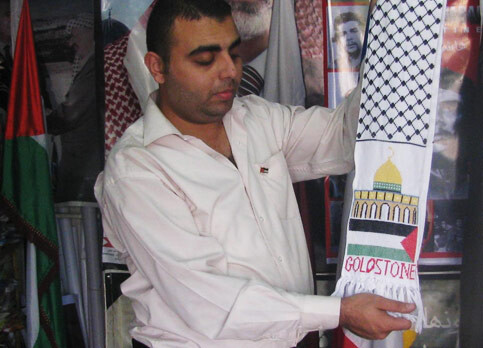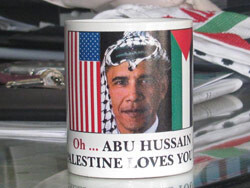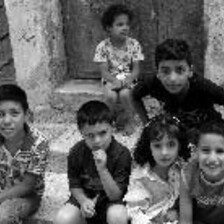Gaza Strip 10 November 2009

Tareq Abu Daya shows off the Goldstone kuffiyeh at his shop in Gaza City.
Tareq Abu Daya, owner of a popular souvenir shop in the heart of Gaza City, has recently offered his customers a new kuffiyeh, or traditional checkered scarf, on which the name of Judge Richard Goldstone is inscribed.
“When the famous UN report of Judge Richard Goldstone was first made public, I thought of something that would be in honor of such a significant report that accuses Israel of war crimes against Gaza during the last war,” Abu Daya said.
Abu Daya’s idea is the latest of similar novelty souvenirs that his shop has sold over the past several years to Palestinians and internationals visiting the territory. Every noteworthy occasion and event is marked with a new creative souvenir — from Israel’s unilateral withdrawal from Gaza in 2005 to the failed Annapolis summit.
“The Goldstone report is considered a very important event that might bring to justice Israeli war criminals who committed war crimes against the residents of the Gaza Strip during the last Israeli war on the region. My shop would offer this kuffiyeh as a sort of tribute to Mr. Richard Goldstone, who bravely revealed Israeli war crimes against the Palestinians,” Abu Dayeh explained while showing off the new merchandise.
Since the kuffiyeh was first offered by the Abu Daya store, more than 150 customers purchased it as a sign of their appreciation for Judge Goldstone and his report.
“Unfortunately, I have not sold a large number of this kuffiyeh, apparently because of the economic conditions here in Gaza due to the crippling Israeli blockade on the territory. A kuffiyeh with Goldstone is sold for 85 shekels [$22 US] and because of the bad economy here this price is inflated. The reason for this price is that such a kuffiyeh is made by some women at their homes in northern Gaza,” Abu Daya made clear.
Inside the shop, one can find many other homemade souvenirs including kuffiyehs, trinkets, plates, cups and flags. All feature different forms of inscriptions or paintings, mostly related to Palestine and the struggle for justice.

“However, I do hope that America would not let us feel disappointed by its veto power once the Goldstone report is submitted to the UN Security Council. Such a disappointment was felt widely here when the US Secretary of State Hillary Clinton supported Israel’s terms for peace. Nevertheless, I will keep making new souvenirs that show our reality and reflect our Palestinian life.”
Last week, the UN General Assembly voted to approve the Goldstone report, while the US, Israel and a handful of other countries objected to the report which accuses both Israel and Hamas of war crimes.
The report calls on both parties to conduct serious investigations into these allegations so that those responsible are brought to justice. UN Secretary General Ban Ki-moon said he would submit the report’s findings to the UN Security Council for consideration.
In Gaza, reactions to the report were varied — some considered it a step in the right direction that would curb Israel from committing more crimes against the Palestinians in the future, while others viewed it as merely ink on paper.
“The Goldstone report would [absolve] the repressed people in the international community,” stated 21-year-old Ahmad Abulnour, who was passing by Abu Daya’s store.
However, not everyone was as optimistic.
“The American veto would make implementation of justice difficult. I don’t expect any change out of such a report. For this report to exist or not to exist, is the same for me,” Ahmad Abu Karsh said while he and his wife chatted as they walked down a street near the Palestinian Legislative Council building in Gaza City.
Twenty-eight-year-old laborer Mohammad al-Moghramy expressed some hope towards bringing Israel to justice. “Actually, it is a good chance for us to see punishment of Israel. When this report was submitted internationally, we felt somehow relieved, hoping Israel will be prevented from perpetrating more crimes against us.”
“The report can be considered politically fair to the Palestinian people, but is against the Palestinian people’s resistance against the Israeli occupation. But it won’t change our reality due to our past experiences with previous reports or even UN Security Council resolutions,” said Mahmoud, who refused to give his full name, as he was heading down the same street as the Abu Karsh couple.
Gaza’s university students have their own opinions on the Goldstone report. Eman al-Qudsi, a student of the Arabic language, expressed her disappointment regarding the international community’s actions towards the Palestinian people. “Goldstone’s report is truly international, yet I believe that this report will be foiled by an American veto.”
Khetam Abu Mandil, also a student of Arabic, believes that the report is useless. “Our cause is clear enough and I believe that the UN Security Council and the UN itself are American-made, so I don’t foresee any real change due to such a report.”
Back at Abu Daya’s shop, the jaded attitude of Gaza’s residents is reflected in the demographics of the Goldstone kuffiyeh sales.
“I have sold the Goldstone kuffiyeh to a large number of foreigners, including international aid workers or journalists in Gaza, while the locals who have bought this kuffiyeh are customers who have enough cash,” the shopkeeper said.
All images by Rami Almeghari.
Rami Almeghari is a journalist and university lecturer based in the Gaza Strip.





